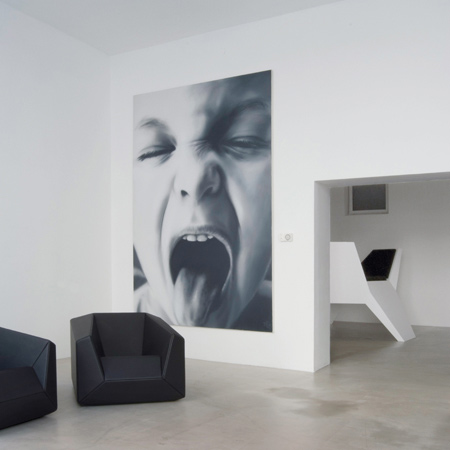Austrian designer Thomas Feichtner has completed an interior called The Pixel Hirschgasse for the Pixelhotel project in Linz, Austria.
Pixelhotel is a Linz 2009 European Capital of Culture project, which converts individual rooms throughout the city into unconventional hotel rooms for the year. The Pixel Hirschgasse is located at the Simone Feichtner Gallery.
Feichtner designed furniture and artwork for the project, including Mayas Bed (above).
The following information is from Thomas Feichtner:
--
The Pixel Hirschgasse
The Pixel Hotel is an architecture project for Linz09. Individual rooms located throughout the city of Linz were adapted as hotel rooms for the year as European Capital of Culture. Each of the hotel rooms - six to date - has a different design. The Austrian designer Thomas Feichtner designed the Hirschgasse 17 Pixel, which is located on the premises of the Simone Feichtner Gallery in downtown Linz. The furniture designed for this purpose should not be seen as fixtures but as individual showpieces, and they should be used. The walls of the gallery display the artwork and pictures by Thomas Feichtner.
The Brazil-born artist Thomas Feichtner lives and works in Linz with his wife Simone Feichtner. A graduate from the University of Art and Industrial Design, Linz, he created a number of products for traditional manufactories and craft enterprises and received international design awards. In his work Thomas Feichtner takes an experimental approach to designing objects and is in constant pursuit of a strategy, keeping his distance from globalization and mass production. His work focuses on cultural and artistic aspects of design, formal development and a break with a purely functional appreciation of design. His work was featured in exhibitions at the Triennale di Milano, the Museum for Applied Arts in Vienna, and the Gansevoort Gallery in New York.
Pixel Hotel Linz
Pixelhotel is a Linz 2009 European Capital of Culture project.
Pixelhotel invites its guests to spend their stay in Linz residing in not-your-everyday accommodations—in a Pixelhotel providing a very unconventional sort of lodging. The individual rooms and suites are dispersed throughout the entire city. Here, a room’s situated in an old storefront; there, it’s in a former workshop set on a backstreet courtyard or on a ship. All over town, there are interesting but unused premises that are being converted into hotel rooms in conjunction with this urban development and architectural project. They’re in nice residential areas, downtown, industrial zones and working-class neighborhoods—after all, every part of town has its stories to tell and the Pixelhotel lets guests experience them right up close.
A Pixel is the smallest unit of the hotel. For breakfast, though, guests have to leave the premises and make their way to one of the cafés located nearby. Same goes for lunch and dinner: you’re called upon to take city map and transit system pass in hand and discover the culinary pleasures the city has to offer. Thus, the restaurants of Linz serve as the hotel’s dining room, and neighborhood pubs with their local color more than make up for the absence of a lobby bar.

